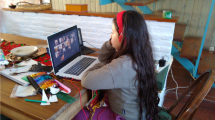Abstract
This chapter describes a program designed around the use of handhelds and other mobile devices in a citizenship education program which has been implemented in a school in Singapore, in the Upper Secondary Social Studies syllabus. There is a general assumption that students are equipped with an adequate conceptual understanding of the theme of the macro concept of Conflict, one of the main themes of the syllabus. However, experience shows that this concept remains abstract to 15-year-old students who have limited experience, having been brought up in a relatively safe and secure environment in Singapore. The case studies in the Social Studies syllabus are much more complicated as they are multidimensional, involving clashes of interests, ideas, points of views and emotions. The program aims to afford students learning experiences which provide opportunities for the learning and examination of alternative, and often multiple, perspectives of controversial issues; the students will be given opportunities to discuss and express these perspectives through participation in a structured collaboration activity known as the Structured Academic Controversy (SAC). The pedagogy of the SAC is well known among Singapore teachers in Humanities departments and has been used to provide structure and focus to classroom discussions in various subjects. A primary innovation of this program is that teachers will design SAC activities going beyond face-to-face interactions (as has been the practice in schools, so far). Building upon the work of Lim (Enhancing fieldwork in social studies through remotely conducted structured academic controversies. Teach Learn, 25(2). National Institute of Education, Nanyang Technological University, Singapore, pp 189–195, 2004, Adolescent collaborative discourse through messaging. In: Aykin N, Preece J (eds), Internationalization, online communities, and social computing: Design and evaluation. 11th International Conference on Human-Computer Interaction, Lawrence Erlbaum Associates, 2005), the program investigates how SAC activities can be transposed beyond the confines of the classroom (field-based SAC), as well as augmented through practice using 1:1 handheld devices (mobile-based SAC).
Access this chapter
Tax calculation will be finalised at checkout
Purchases are for personal use only
Similar content being viewed by others
References
Habermas, J. (1981). The theory of communicative action. London: Heinemann.
Infocomm Development Authority of Singapore (IDA Singapore). (2006). Singapore national ICT masterplan – iN2015 strategic framework. available via UNPAN. http://workspace.unpan.org/sites/Internet/Documents/UNPAN032993.pdf. Accessed 26 Apr 2016.
Infocomm Development Authority of Singapore (IDA Singapore). (2012, November 27). Two future schools to push learning boundaries with next generation solutions. Retrieved from https://www.ida.gov.sg/About-Us/Newsroom/Media-Releases/2012/Two-FutureSchools-to-Push-Learning-Boundaries-with-Next-Generation-Solutions
Infocomm Development Authority of Singapore (IDA Singapore). (2016). Telecommunications. Retrieved April 26, 2016 from https://www.ida.gov.sg/Tech-Scene-News/Facts-and-Figures/Telecommunications
Johnson, D. W., Johnson, R. T., & Smith, K. A. (1997). Academic controversy: Enriching college instruction through intellectual conflict. Washington, DC: George Washington University.
Koh, T. S., & Lee, S. C. (Eds.). (2008). Information communication technology in education: Singapore’s ICT masterplans, 1997–2008. Singapore: World Scientific Publishing Company.
Lim, K. Y. T. (2004). Enhancing fieldwork in Social Studies through remotely conducted Structured Academic Controversies. Teaching and Learning, 25(2). National Institute of Education, Nanyang Technological University, Singapore, pp. 189–195.
Lim, K. Y. T. (2005) Adolescent collaborative discourse through messaging. In N. Aykin & J. Preece (Eds.), Internationalization, online communities, and social computing: Design and evaluation. 11th International Conference on Human-Computer Interaction, Lawrence Erlbaum Associates.
Margaryan, A., Littlejohn, A., & Vojt, G. (2011). Are digital natives a myth or reality? University students’ use of digital technologies. Computers & Education, 56(2), 429–440.
Myerson, G. (2001). Heidegger, Habermas and the mobile phone. Cambridge: Icon Books.
Perkins, D. (1992). Smart schools: Better thinking and learning for every child. New York: The Free Press.
Putnam, R. D. (1993). The prosperous community: Social capital and public life. The American Prospect, 4(13), 35–42.
Sharples, M., Taylor, J., & Vavoula, G. (2010). A theory of learning for the mobile age. In B. Bachmair (Ed.), Medienbildung in neuen Kulturräumen (pp. 87–99). Wiesbaden: VS Verlag für Sozialwissenschaften.
Song, L., Singleton, E. S., Hill, J. R., & Koh, M. H. (2004). Improving online learning: Student perceptions of useful and challenging characteristics. The Internet and Higher Education, 7(1), 59–70.
Vygotsky, L. S. (1978). Mind in society: The development of higher psychological processes. Cambridge, MA: Harvard University Press.
Wiggins, G., & McTighe, J. (1998). Understanding by design. Alexandria: Association for Supervision and Curriculum Development.
Author information
Authors and Affiliations
Corresponding author
Editor information
Editors and Affiliations
Rights and permissions
Copyright information
© 2017 Springer Nature Singapore Pte Ltd.
About this chapter
Cite this chapter
Lim, K.Y.T., Cheah, H.M. (2017). The Use of Structured Academic Controversy in a Mobile Environment to Broaden Student Perspectives and Understanding in the Social Sciences. In: Murphy, A., Farley, H., Dyson, L., Jones, H. (eds) Mobile Learning in Higher Education in the Asia-Pacific Region. Education in the Asia-Pacific Region: Issues, Concerns and Prospects, vol 40. Springer, Singapore. https://doi.org/10.1007/978-981-10-4944-6_14
Download citation
DOI: https://doi.org/10.1007/978-981-10-4944-6_14
Published:
Publisher Name: Springer, Singapore
Print ISBN: 978-981-10-4943-9
Online ISBN: 978-981-10-4944-6
eBook Packages: EducationEducation (R0)





